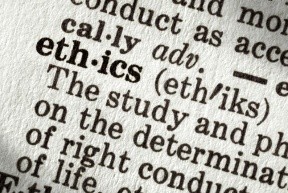Questions about workplace ethics have no
single or simple answer. So much depends on a situation’s specifics. Even
issues that seem straightforward can present numerous hidden traps—both legal
and ethical—to the people trying to resolve them.

Image source: https://www.webjunction.org/explore-topics/legal-responsibilities-ethics.html
To make things even more complicated in HR,
practitioners have “well-defined responsibilities but also have
responsibilities as a private citizen, as a workplace colleague and maybe as a
friend,” said Michael Connor, editor and publisher of the online magazine Business
Ethics. “Those are all very different roles.”
When an ethics question arises, Connor says,
HR professionals need to understand exactly what role they’re playing. “As
a representative of the company, you have one set of responsibilities. As a
concerned private citizen, you have other responsibilities. It’s nice when
those converge, but that’s not always the case.”
Make Boundaries Clear
The stakes involved in ethical questions are
often high, if not for the company, then for the employees and managers who are
involved. For example, what’s an HR generalist to do when he promises to hold
something in confidence and that pledge proves impossible to keep?
John Boyce, Vice President of Human Resources
for enhanced network provider Vail Systems in Deerfield, Ill., faced that
conundrum at a previous employer.
Boyce said that HR professionals have to set
boundaries around what “in confidence” means. While he had promised
confidentiality to the employees he was training, keeping that promise would
have resulted in potentially life-threatening operations continuing at the
refinery, unbeknownst to management. Today, he instructs his staff members to
tell workers that if they tell HR something in confidence that should be
reported, then HR will do so.
Deciding What to Do
Many common situations that confront HR
professionals may seem to be ethical dilemmas but are actually professional
judgment calls, Sack noted. For example, if an HR staffer suspects an employee
is the victim of domestic violence, is the staffer obligated to call the
police? What if an employee asks to forgo a pay increase because accepting it
would mean a cut in social services benefits? Or another is using a parking
placard intended for people with disabilities and bragging to co-workers that
it actually belongs to her brother-in-law and she’s just “borrowing”
it for her own convenience? Does HR have an obligation to look into such
matters?
The answer varies. “I see HR as having to
determine whether the issue involves the employer or not,” Sack said.
“They have to decide if it’s appropriate or necessary to get involved or
not.”
MacDonald said, “Where I live there’s a
legal duty to report suspected child abuse. If an HR professional came to
suspect that, the legal duty is sufficiently strong that no one should need to
engage in nuanced ethical reasoning. If you’re not sure whether there’s a legal
issue, you need to consult a lawyer.”
And bear in mind that areas that at first seem
gray often are clarified the more you learn about them. “Many ethical
dilemmas depend on a precision of facts,” Connor said. This is why he
“gets nervous” when he hears that a practitioner “suspects”
an employee “is somehow involved” in a domestic-violence situation,
for example.
“Facts matter,” he emphasized.
“The instinct to help is admirable, but make sure you have your facts
straight. If you’re not familiar with domestic abuse situations, consult with
qualified professionals. Good intentions do not overcome the harm that can be
done to an employee and/or his or her family” if you report your
suspicions to the police and they turn out to be unwarranted.
Boyce agreed. “I wouldn’t tell the
generalist to call the police. Since they’re not a mandated
reporter, it would be overstepping on the company’s part,” he
said. “I would encourage the generalist to talk to the person and provide
EAP (Employee Assistant Program) information and perhaps more targeted material
or information, such as for a domestic abuse hotline, but taking it to the next
step is going too far.”
“HR can certainly confirm the employer’s
support for the victim,” Sack said. “And some jurisdictions may
confer certain legal rights on victims of domestic violence, such as time off
from work to go to court. But I wouldn’t recommend reporting your suspicions to
authorities unless you have explicitly obtained the victim’s consent. Reporting
it without the victim’s knowledge and consent could make things worse for the
victim.”
Ethics Without Judgment
Connor warns that practitioners “need to
be extremely careful” not to apply judgments that could be based on
socioeconomic bias when addressing such situations.
“When an upper-class executive chooses to
work part-time or flex-time in order to be more available for her or his
children, that’s not generally frowned upon—in part because that executive
often has additional sources of income and doesn’t require social
services,” he said. “Workers on the lower end of the salary scale
often need to make different—but equally difficult—decisions that affect their
status, pay and benefits.”
It’s Complicated
When many HR professionals confront ethical
questions, they “seem not to know what to do, or even how to think about
such matters,” said James O’Toole, director of the Neely Center for
Ethical Leadership at the University of Southern California. He sees practitioners
as being “far more comfortable dealing with [legal issues], especially
when it comes to questions relating to labor law, which they see as
legitimately within their bailiwick.”
“As you will quickly surmise, ethics
isn’t about a set of rules,” he explained. Rather, it’s a way of thinking
about how you conduct your life and do your job. “Alas, HR people tend,
instead, to think in terms of rules, and that may well be the reason why they
shy away from ethics.”
While HR practitioners may object to O’Toole’s
contention that they “shy away” from ethical issues, many would
probably agree with Boyce when he says, “The legal issues are relatively
easy. There’s a pretty clear line. The struggle comes when something is legal
but wrong.”
It’s not easy making tough decisions on your
own; sometimes it’s hard to know the right decision for your business without a
second opinion. The ethical decision is not always the same as the responsible,
legal decision. Converge HR Solutions is your ideal partner, there for all of
your HR needs. Whether it’s as simple as professional advice, or a long hiring
process for new employees, our team of experts is ready for it all. Our
experience and knowledge is the resource you’re looking for. To browse our services, visit https://convergehrsolutions.com/. Contact us directly at info@convergehrsolutions.com or 610-296-8550.


0 Comments